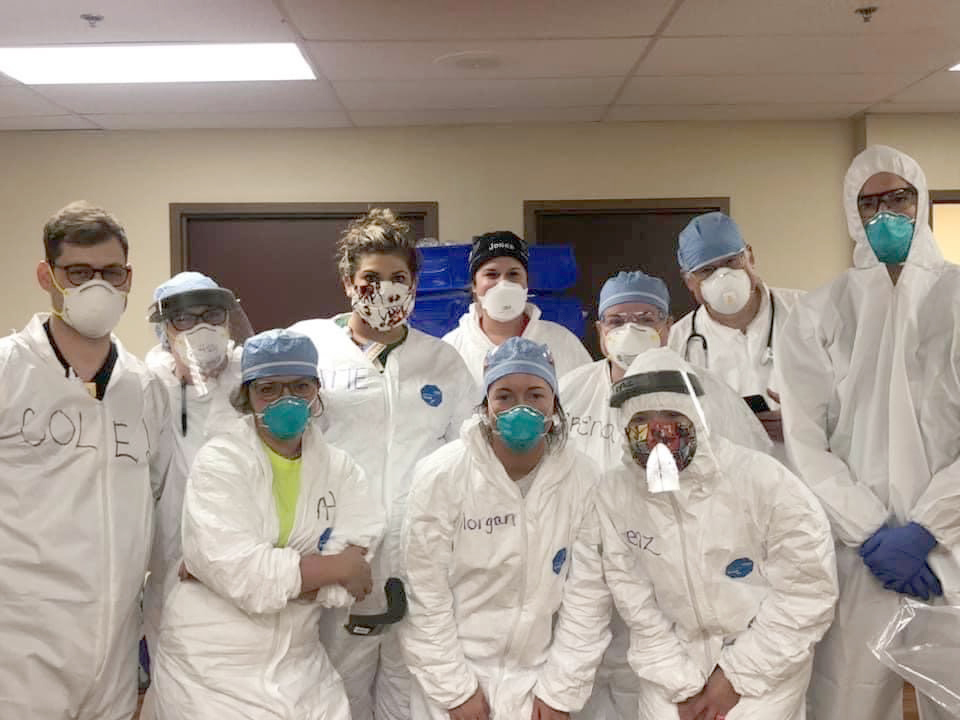
The job market for nurses is way out of whack. Traveling RNs are making a lot more money than the full-time staffers doing the same job. And that’s causing staffers to hit the road to take a traveling gig, only to be replaced by an expensive traveler.
The escalating pay is both a product of — and partially responsible for — the staffing trouble in hospitals which has exceeded critical levels in recent weeks, especially in the under-vaccinated South.
“We work hard, and just weren’t seeing the benefits,” says Donna Pearson, one of the estimated 2,000 nurses in the state of Mississippi who left a full-time hospital job during the pandemic.
Many — as in Pearson’s case — have just gone to another hospital, as a traveler.
“I’m going to follow the money,” she says.
And the money, Pearson says, is crazy.
Traveling nurses have always made more than full-time nurses at hospitals, and they usually get a stipend for meals and lodging. But now it’s many times more.
Pearson is headed to Midland, Texas where she’ll make more than $120 an hour. Recruiters are regularly luring nurses with contracts exceeding $5,000 a week.
Subsidized by the feds
How can hospitals afford this? Several southern states, including Texas, Mississippi and now Tennessee, are using their federal COVID relief money to help hospitals pay the ever-rising hourly rates. The state Pearson is leaving is simultaneously paying to bring in 1,000 traveling nurses to the cost of $10 million a week.
And Texas is up to nearly 4,000 travel nurses being funded by the government, says Carrie Kroll with the Texas Hospital Association.
But for the hospitals, there are downsides to relying so heavily on high-paid travelers — mostly morale.
“It does take its toll,” says Kroll.
In Texas, Kroll says some hospitals are offering staff nurses retention bonuses. But it’s nothing like the money the same hospitals are paying temporary nurses, who often need help getting up to speed.
And it’s the lower-paid staff nurse who does the training.
‘It is infuriating’
“When you have nurses working on a bedside, and they’ve committed to staying, and their colleagues are leaving and are coming and making a lot more money than they are, I think it’s hard when you’re in this environment and you’ve been dealing with COVID day after day,” says Kroll.
But “hard” is not the word Taylor Wylie uses. She’s an ICU nurse in Nashville.
“I mean, it is just infuriating that they are willing to pay these travelers bookoo dollars,” she says.
It seems like the only way to get a pandemic payday is to leave, Wylie says, even though the hospital will likely have to fill the vacancy with a pricey traveler.
“Just within the past couple of weeks, we’ve had so many nurses put in their two weeks and go travel,” she says. “I’ve seen contracts upwards of $10,000 to $12,000 a week because hospitals are so desperate for staff.”
The thing is, there should be enough nurses to go around, experts say, even though the American Nurses Association calls it a “national crisis.”
A shortage?
There is a projected shortage of nurses compared to estimated needs in the future, according to the American Association of Colleges of Nursing. But the number of nursing students has been growing, keeping up with demand each year, says nursing professor Karen Lasater at the University of Pennsylvania.
“It’s not a nursing shortage,” she says. “It’s a shortage of well-funded positions for nurses.”
And right now, the critical positions needed are in ICUs and emergency departments. But they are among the most taxing nursing jobs.
It’s not just the pay.
Lasater says in most states, there are no strict rules about how many patients a floor nurse might have to be responsible for. So especially in a pinch, some are watching eight or 10 at a time.
“That’s unsustainable,” she says.
It’s too soon to say if nursing will be forever changed — in working conditions or pay. Professor Joanne Spetz at the University of California San Francisco says she could see more nurses staying in traveling roles for a while, while the money is so good.
But it’s more likely that as COVID cools off, hospitals will have to move quickly to training a new crop of fresh nurses, replacing the retirees who have left the profession early.
“That really is then shifting this emergency thing into the long-term investment philosophy, and that’s really where we’re going to have to go,” says Spetz.
There’s a saying among traveling nurses — you can either treat me poorly or pay me poorly, but not both. Hospitals are getting the message. But in the short term, the only solution is to pay whatever it takes.

